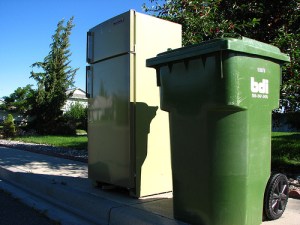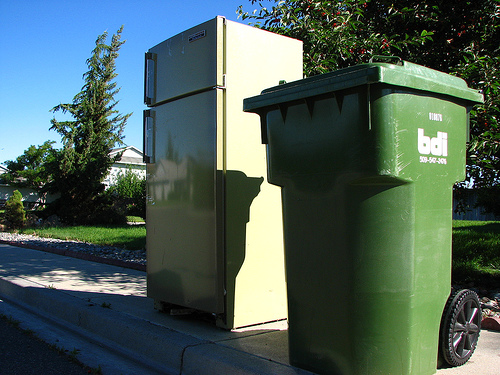Send your question to Umbra!
Q. Dear Umbra,
I’ve been in my rental apartment for 20 years and have had the same refrigerator the whole time. A friend told me a new refrigerator would be much more energy-efficient. While it leaks a bit now and then, my current refrigerator works fine, and my electric bill is OK – about $30 a month. Should I buy a new one for the efficiency? Would that offset my old but still-functioning refrigerator being landfilled?
Tam T.
San Francisco, Ca.

Photo by Matt McGee.
A. Dearest Tam,
Before we get to poking around in your refrigerator, let me leak a big secret: April is my birthday month! In a few weeks, Grist will be celebrating 10 years of Ask Umbra — so please feel free to shower me with warm wishes, surprise me with incredibly original questions, or pen a birthday haiku in my honor. The most creative notes I get will be featured on the site.
Now back to our regular programming. Tam, you had me at “it leaks a bit now and then.” I’m wondering what it leaks. Coolant? Water? The last remnants of soup from a forgotten meal? Whatever the substance, it indicates that your fridge, besides being a hulking old energy-sucking dinosaur, is probably operating even less efficiently than it should.
Your friend is right: It is time for a new refrigerator.
The efficiency of these machines — which can gobble the most power of any household appliance, what with their friendly always-on policy — has improved dramatically in the past 20 years. Our friends at the Energy Star program recommend replacing any refrigerator manufactured before 1993, and tell us that new refrigerators can be twice as efficient as older models, saving you $100 a year. Go ahead, play with their handy-dandy fridge-shaped calculator!
It sounds as if your energy costs are low (especially compared to the national average of $110 per month — do you read by candlelight in the evenings?), so a better motivation for you might be the knowledge that a newer machine would require the use of fewer fossil fuels, lowering your carbon impact, helping to slow climate change, and keeping the world from spinning out of control. No pressure, though.
While I understand your concern over your loyal beast being consigned to a landfill, you should take heart: Up to 90 percent of a refrigerator can be recycled. The awesomely acronymed Responsible Appliance Disposal program – RAD! — a partnership between the EPA, General Electric, and others, is trying to increase that by ensuring that the other 10 percent, mostly foam and coolant, also meets a proper end. You do not want to miss the videos of GE’s newfangled fridge-dismantling machine – wonky (skip to the 2:00 mark) or slick.
You might also be in a position to get a little fast cash from your old fridge: Some utilities and municipalities offer small rebates to encourage appliance recycling. In San Francisco, PG&E offers a $35 rebate, and the city fathers have a helpful list of recyclers. Those in other areas should check out EPA’s rebate locator. Whatever you do, make sure your old fridge won’t be reconditioned and reused, sticking some other sucker with a frosty energy hog and defeating the purpose of your upgrade.
Since you are a renter, you might even be able to convince your landlord to foot the bill! If you or any other dearest readers need to make the case to building management that energy-efficiency is important, check out these tips on talking to your landlord (yes, they’re aimed at restaurateurs, but they’re the most helpful I could find), these resources for tenants, and of course my tips for being a more energy-efficient renter.
Finally, be sure to check out these buying guidelines from the American Council for an Energy-Efficient Economy — which also has tips for minimizing the energy use of your current fridge, should you find you’re too attached to let it go. But here’s to a leak-free future!
Coily,
Umbra



